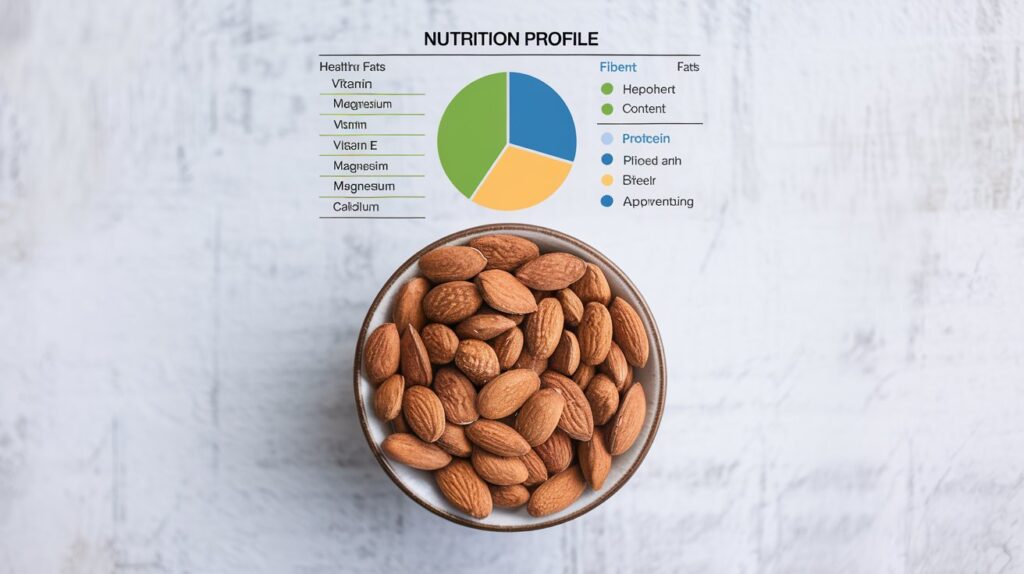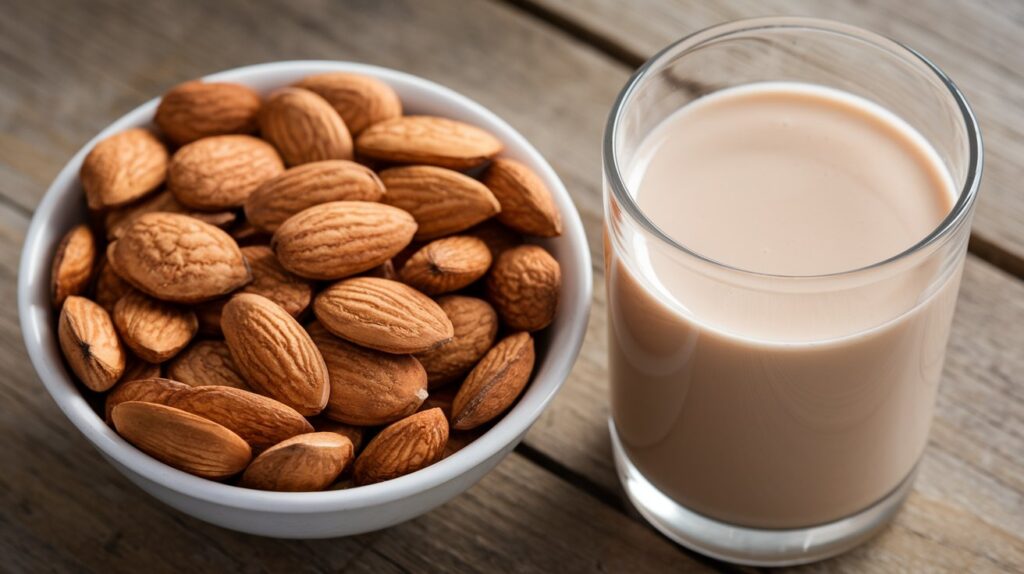
Outline of the Article
- What Are the Health Benefits of Almonds?
- Nutritional Overview of Almonds
- Almonds and Heart Health
- Almonds for Weight Management
- Almonds Improve Brain Function
- Almonds Promote Healthy Skin
- Almonds Support Digestive Health
- How to Incorporate Almonds Into Your Daily Routine
- Delicious Almond-Based Recipes
- Conclusion
- FAQs
What Are the Health Benefits of Almonds?
Almonds are more than just a tasty snack; they are a powerhouse of nutrients packed into a small package. From heart health to brain function, almonds provide numerous benefits that can greatly impact your overall well-being. In this article, we’ll explore the incredible health benefits of almonds and how you can easily incorporate them into your daily routine.
Nutritional Overview of Almonds

High in Healthy Fats
Almonds are an excellent source of healthy monounsaturated fats, which are known for lowering bad cholesterol and reducing the risk of heart disease. These fats are similar to those found in olive oil and contribute to better cardiovascular health.
Rich in Vitamins and Minerals
A handful of almonds provides substantial essential vitamins and minerals, including vitamin E, magnesium, and potassium. These nutrients are vital for maintaining bone health, muscle function, and immune system support.
Packed with Antioxidants
Almonds are loaded with antioxidants, particularly vitamin E, which helps protect cells from oxidative damage. This can lower the risk of chronic diseases and slow aging. Learn more…
Almonds and Heart Health
Reducing Cholesterol Levels
Regular consumption of almonds has been shown to reduce LDL (bad) cholesterol levels. Almonds contain plant sterols that block the absorption of cholesterol in the intestines, helping to keep your heart healthy.
Supporting Blood Vessel Health
Almonds are also rich in magnesium, which helps relax blood vessels and improve blood flow. This can reduce the risk of high blood pressure and improve overall cardiovascular health.
Almonds for Weight Management
Boosting Metabolism
Almonds are a nutrient-dense food that can boost your metabolism. They contain protein and healthy fats that increase your metabolic rate, helping you burn more calories even when at rest.
Keeping You Full Longer
Thanks to their high fiber content, almonds keep you feeling full for longer periods. This can reduce your overall calorie intake and support your weight management goals.
Almonds Improve Brain Function
Enhancing Memory and Cognitive Function
Almonds are considered brain food, rich in riboflavin and L-carnitine, both of which have been linked to improved cognitive function. These nutrients can help sharpen memory and reduce the risk of cognitive decline as you age.
Almonds as a Brain-Boosting Snack
Snacking on almonds is an easy way to fuel your brain. They provide a steady release of energy, helping you stay focused and alert throughout the day.
Almonds Promote Healthy Skin

Vitamin E and Skin Health
Almonds are a fantastic source of vitamin E, a powerful antioxidant that nourishes the skin and protects it from damage caused by UV rays. Eating almonds can help maintain smooth and hydrated skin. Learn more…
Reducing Skin Aging
The antioxidants in almonds combat free radicals, which are responsible for early signs of aging, such as wrinkles and fine lines. Regular almond consumption can give your skin a youthful glow.
Almonds Support Digestive Health
Rich in Fiber
Almonds are high in dietary fiber, which aids digestion by promoting regular bowel movements. Fiber is essential for a healthy digestive system and can prevent constipation.
Promoting Gut Health
The fiber in almonds acts as a prebiotic, feeding the good bacteria in your gut. This promotes a healthy gut microbiome, which is linked to improved digestion and overall health.
How to Incorporate Almonds Into Your Daily Routine

Snacking on Raw Almonds
One of the easiest ways to enjoy almonds is by eating them raw. A small handful can provide you with a quick and nutritious snack that’s perfect for boosting energy levels during the day.
Adding Almonds to Smoothies
Tossing a few almonds into your morning smoothie is a great way to add extra nutrition. They blend well with fruits and vegetables, making your smoothie more filling and delicious.
Using Almond Butter in Recipes
Almond butter is a fantastic alternative to peanut butter and can be spread on toast, mixed into oatmeal, or used in baking recipes for a nutty twist.
Almond Milk as a Dairy Alternative
If you’re lactose intolerant or prefer plant-based milk, almond milk is a great option. It’s low in calories and makes an excellent substitute in cereals, coffee, or recipes that call for milk.
Delicious Almond-Based Recipes
Almond Energy Bites
These bite-sized snacks are crafted from a blend of almonds, dates, and a touch of honey, making them perfect for a quick energy boost during the day.
Almond Butter Smoothie
Blend almond butter with bananas, spinach, and almond milk for a creamy, nutrient-packed smoothie that’s both refreshing and satisfying.
Roasted Almonds with Spices
Roasting almonds with a sprinkle of spices like paprika or cinnamon can transform them into a delicious, savory snack.
Conclusion
Almonds are a versatile and nutritious food that can benefit your health in numerous ways. From improving heart health to boosting brain function and promoting radiant skin, almonds are a great addition to any diet. Incorporating them into your daily routine is easy, whether you snack on them raw, blend them into smoothies, or enjoy almond-based recipes. So, next time you’re looking for a healthy snack, reach for a handful of almonds!
FAQs
Are almonds good for weight loss?
Yes, almonds are rich in fiber and protein, which can keep you feeling full longer and reduce overall calorie intake, aiding in weight management.
How many almonds should I eat per day?
A recommended serving size is around 1 ounce (about 23 almonds) per day for optimal health benefits.
Can almonds improve skin health?
Absolutely! The vitamin E and antioxidants in almonds help protect and nourish the skin, promoting a youthful appearance.
Are there any side effects of eating too many almonds?
While almonds are healthy, consuming them in excess can lead to weight gain or digestive issues due to their high fat content.
Is almond milk a good alternative to regular milk?
Yes, almond milk is a low-calorie, dairy-free alternative that can be used in most recipes that call for regular milk.

Leave a Reply